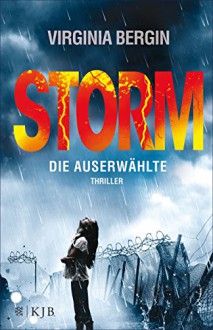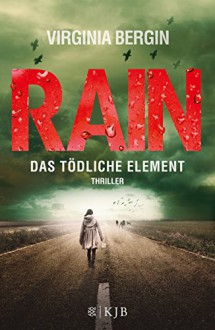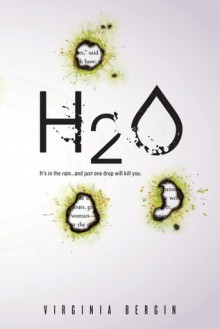
THE END OF THE WORLD WAS JUST THE BEGINNING . . .
In this sequel to The Rain Ruby’s fight for survival continues in a world where water is deadly.
"I'll tell you a weird thing about apocalypses - a thing I didn't even know until I was in one: they seem pretty bad, don't they? Well, take it from me: they can always get worse."
Three months after the killer rain first fell, Ruby is beginning to realize her father might be dead . . . and that she cannot survive alone. When a chance encounter lands her back in the army camp, Ruby thinks she is safe - at a price. Being forced to live with Darius Spratt is bad enough, but if Ruby wants to stay she must keep her eyes - and her mouth - shut. It's not going to happen. When she realizes what is going on - the army is trying to find a cure by experimenting on human subjects - Ruby flips out . . . and makes an even more shocking discovery: she's not useless at all. The Storm begins . . .
By: LazerBooks
The Storm is the SEQUEL to "H2O" ,the apocalyptic novel about killer rain.
In British novelist Virginia Bergin's The Storm, 15-year-old Ruby Morris is trying to survive the apocalypse that killed her mother and brothers and most of humanity. Ruby goes from being a normal girl to having to experiance the dark side of human nature. It took me a while to review this book because I decided to also read the first book in the series in order to have a better understanding of the main character's situation. The story starts of where "The Rain" left, with the main protagonist Ruby describing how much she hates the rain, which no one can blame her for since it did kill most of the people on earth. I liked how in the first book we are introduced to a shallow and materialistic girl with no worries and in the second book as a independent and a survivor. In the beginning of the book we see how she still struggles with the death of her family members and not knowing weather her father is still alive is driving her crazy.

She's all alone until her friend Saskia arrives. Even through all the seriousness there's also a funny moment when she's in the library and she rates books based on their helpfulness LOL she even researches clouds. "Yup, that’s how bad things got: I broke into Dartbridge Public Library. Studying up on clouds (I know twenty -four different types!) didn’t seem like it was going to be enough to get me through this thing. (Through it and into what? That was a whole other question, one best not asked.) My specialist areas of study were: 1. The self-help section. Oddly, there didn’t seem to be that much on feeling a bit gloomy because human life on Earth as we know it has been wiped out— but you could tell people meant well. Ruby usefulness rating: 4/ 10. 2. Microbiology for people who quit biology at the end of eighth grade, weren’t really all that interested in science, and weren’t any good at it anyway. It’s baffling and creepy. Ruby rating: 1/ 10. 3. Car maintenance for people who would have dropped that too if they’d tried to teach it to us in school (which they should have done). I would not have chosen to study this, but something happened. I’ll explain later. Ruby rating: 10/ 10. 4. Survival manuals. Frankly, I could have learned most of this stuff when I was in Girl Scouts, but I tended to opt for the cake-making side of things (the benefits seemed more obvious at the time). However, not even the SAS (the Special Air Service = very, very good-at-surviving-stuff British Army crack force), who have handy tips on surviving a nuclear bomb going off right next to you, seem to have been able to have imagined this particular kind of disaster. Or maybe they did, but when people saw the chapter on how the army would abandon anyone they had no use for and we’d all be left to fend for ourselves, they complained that it was an outrage and a lie and the SAS were forced to take it out. (Even though it was TRUE.) Nevertheless, Ruby rating: 7/ 10 (because you never know). 5. Oh , and… one particularly sad and lonely day, I had a quick look at cellular telecommunications. There are no phones and no Internet anymore, so I was just curious, I suppose, about how difficult it’d be to build and run a thing like that. (Quite difficult, I think. Judging from the diagrams.) Ruby rating: 0/ 10."

What first attracted me about this book was the idea that water could cause all this damage. Even though I enjoyed the book I did feel like the ending was rushed and left me with some unanswered questions! Miss Bergin did a wonderful job creating a believable teenage character and the story held my interest leaving me wanting more. This book will forever leave me feeling differently everytime I look at the rain.
Overall, I give this book 4.5 stars.****
Favorite Quotes:
" I was going to die alone on Hay Tor. My body would be pecked at by crows, nibbled on by sheep bored of grass. Foxes would come and have a good old chew on my bones— maybe drag a few back to the den for the cubs. Someone someday would put my rain-eaten, worm-licked, weather-worn skull on top of the highest stone, and Hay Tor would get a whole new name: Stupid Dead Girl Hill".
Praise for Virginia Bergin’s H2O a VOYA Perfect ten Book of 2014!
“[ H2O] brings life and humor to an otherwise dark situation. Reminiscent of classic post-apocalyptic and dystopian novels from Michael Crichton to Stephen King to Lois Lowry to Suzanne Collins. A great, high-interest read for contemporary teens.”—VOYA
“Creepy and realistic. H2O left me thirsting for more.”—Kristen Simmons, author of Article 5 and Breaking Point
“Ruby’s candid, addicting narration brought this terrifying and wholly plausible story to life. This is a book you’ll devour all at once— from the safety of your umbrella!”—Jessica Khoury, author of Origin and Vitro
“It’s a gripping concept, and there’s something particularly terrifying about the end of the world coming in something as sweet as a misty drizzle. Ruby’s narrative voice is exceptional.”—The Bulletin of the Center for Children’s Books
“Watching Ruby draw strength from her ability to tell her own story is as inspiring as it is harrowing.”—The Horn Book Magazine
“Attention to detail, coupled with a very strong main character, will draw readers in and make them think twice about leaving the house—at least not before checking the sky for signs of rain.”—School Library Journal also By Virginia Bergin H20
About the author
Virginia Bergin learned to roller-skate with the children of eminent physicists.
She grew up in Abingdon, Oxfordshire, in a house tied to her father’s job. Her parents, the children of Irish and Polish immigrants – and one Englishwoman – had moved from Liverpool to the south of England in search of work.
Virginia studied psychology but ruined her own career when, dabbling in fine art at Central St Martins, she re-discovered creative writing. Since then she has written poetry, short stories, film and TV scripts and a play that almost got produced – but didn’t.
In between and alongside more jobs than you’ve had hot dinners, she has worked as a writer on TV, eLearning and corporate projects and has 22 broadcast and non-broadcast TV credits, from children’s favourite Big Cat Diary Family Histories (BBC) to the award-winning series Africa (Tigress Productions for National Geographic). Most recently, she has been working in online education, creating interactive courses for The Open University.
She has lived in North Wales, London and Bristol. In May 2015, she moved from a council estate in Bristol to live in rural Somerset, somewhere between Taunton, Chard and Ilminster. Her nearest neighbour is a horse.


 Log in with Facebook
Log in with Facebook 












